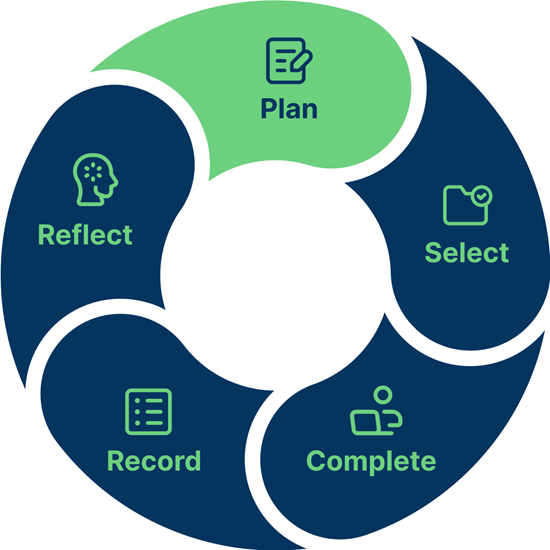By Australian Psychological Society

(last updated February 2025)
Every CPD cycle, registered psychologists must continue to maintain, enhance and extend their knowledge and skills throughout their working lives. Consumers also have an expectation that registered psychologists providing professional services remain competent and contemporary.
The first stage of completing the Psychology Board’s CPD requirements is the development of a learning plan.

Before starting your learning plan it’s important to consider:
- PsyBA’s threshold competencies to map out CPD relevant to your scope
- Ensure your plan aligns with the annual minimum CPD hours
- Consider endorsement requirements, career stage, emerging trends and feedback from previous peer consultation or supervised practice sessions, identifying areas of improvement
- Choose a mix of CPD activities with effective learning methods
- After completing a CPD activity, document your reflection of learning in a journal or consider using the APS CPD logging tool with integrated reflective journal.
- All these considerations are unique to your circumstances, and should reflect your workplace, the skills you want/need to develop, and any professional requirements you’re working towards. It should be a live document that you modify during the year to reflect your experiences and changing needs.
Below, we’ve developed some reflection questions that will be useful to reference in conjunction with the Board’s Guidelines on Continuing Professional Development.
What does my current role demand?
- What is needed in my current position/practice?
- What knowledge and skills will help me perform better at my current career stage and what do I have access to (reading, webinars, supervisor).
- What previous learning activities have I completed?
- What activities were the most interesting or useful and what was it specifically about them that I want to experience more of?
What areas do I need to develop?
Based on Psychology Board of Australia’s (PsyBA) CPD guidelines and professional competencies for psychology where are my knowledge gaps?
The professional competencies for general registration are organised into eight core competencies:
- Applies and builds scientific knowledge of psychology to inform safe and effective practice
- Practises ethically and professionally
- Exercises professional reflexivity, deliberate practice and self-care
- Conducts psychological assessments
- Conducts psychological interventions
- Communicates and relates to others effectively and appropriately
- Demonstrates a health equity and human rights approach when working with people from diverse groups
- Demonstrates a health equity and human rights approach when working with Aboriginal and Torres Strait Islander Peoples, families and communities.
For more on the updated professional competencies visit the PsyBA website.
Do specific requirements need to be met in line with my area of practice endorsement?
Annually at least 16 hours of CPD needs to be related to your area of practice endorsement.
See guidelines on area of practice endorsements.
What are my career goals?
What key knowledge and skills will support me in enhancing my current role or moving into a new role?
Why is a learning plan so important?
Do you find the challenges of work and life push CPD to be deprioritised making it a last-minute thought that makes the process feel expensive or a burden?
Advanced planning will make your experiences more rewarding and better support the development of your skills.
A proactive plan provides valuable insight into yourself in terms of focus during the CPD cycle. The advantages of doing this include:
- Your CPD activities will be aligned with what you’re interested in and the way your career is developing.
- You’ll open up more opportunities to make CPD an asset, rather than a last minute pressure to register for CPD events as they arise.
- You are more likely to be able to take advantages of CPD sales when they occur making it more affordable.
- Planning CPD into your schedule will make it more flexible and convenient. When you’re pressed for time, try CPD on the go and when you have more space in your calendar you can take on eLearning or webinars.
The APS are here to help you every step of the way. If you ever want someone to review your learning plan or talk through what the best CPD activities are to meet your goals we suggest:
- Explore the CPD and events finder where you can search by activity type, topic, dates. Book mark this page now
- Reaching out on PsyCommunity to ask the network of members what recommendations they may have.
- Speaking to your college or interest group members about what they’ve done to advance their skills in your areas of interest.
- Giving our Professional Advisory Service a call and speak to them about your career path.